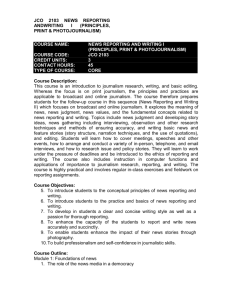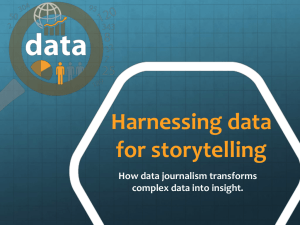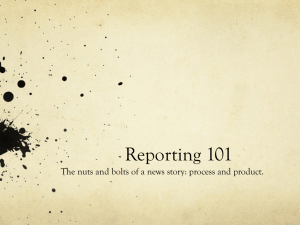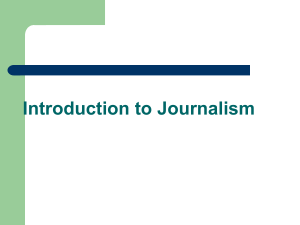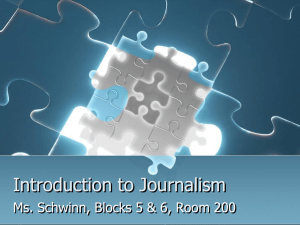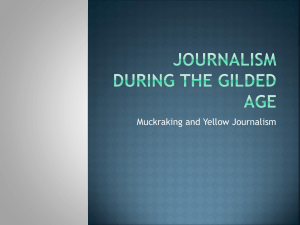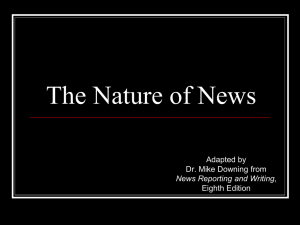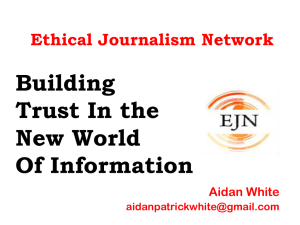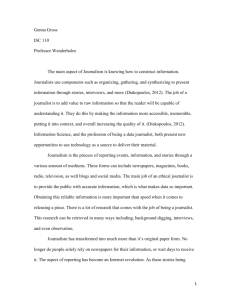Journalists Who Changed the World Through Writing and Photos
advertisement
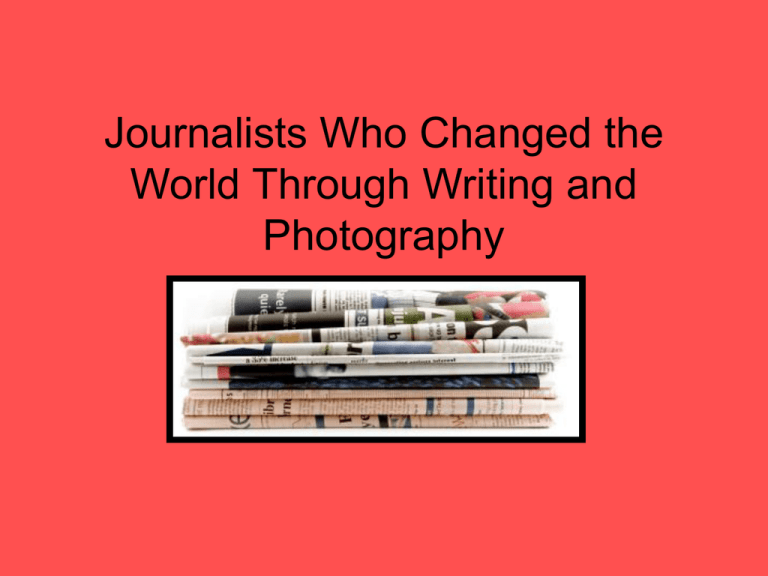
Journalists Who Changed the World Through Writing and Photography Can journalism change the world? • “I am here to tell you that change is gonna come. And it’s not going to come because of politicians. It’s going to come from you and the stories you write.” Journalist, Seymour Hersh, Pulitzer Prize Winning Journalist Bob Woodward and Carl Bernstein • Bob Woodward and Carl Bernstein did much, but not all, of the original news reporting on the Watergate scandal. These scandals led to numerous government investigations and the eventual resignation of President Richard Nixon. John Heresy • Heresy was a Pulitzer Prize-winning American writer and journalist considered one of the earliest practitioners of the so-called New Journalism, in which storytelling devices of the novel are fused with non-fiction reportage. His account of the aftermath of the atomic bomb dropped on Hiroshima, Japan, (“Hiroshima,” published in 1946) “allows its readers to witness history; fiction gives its readers an opportunity to live it.” Randy Shlits • Reports on AIDS, The San Francisco Chronicle, 1981–1985. In 1999, the Department of Journalism at New York University ranked Shilts's AIDS reporting for the Chronicle as one of the top 100 works of journalism in the United States. He also published several books on AIDS, including one on Harvey Milk, a gay politician who was assassinated, which was recently made into a movie. His works brought the truth and reality about AIDS to forefront of the public’s attention. Seymour Hersh • In 1969, Seymour Hersh exposed the story of the massacre from the Vietnamese village My Lai, where 555 unarmed civilians, according to the American journalist, were killed by US soldiers. He is known as one of America’s premier investigative reporters. He has won more than a dozen major prizes in journalism and was awarded the Pulitzer Prize for International Reporting in 1970 for his work on the massacre in South Vietnam. The report prompted widespread condemnation around the world and reduced public support for the Vietnam War in the United States And if you can’t write it, a photo is worth a thousand words… Most pictures can speak a thousand words, but every so often, there comes a photo that screams so loudly that the entire world stops to listen. How does an image change the way we view the world? Dorothy Lange Lange’s photo “Migrant Mother” captures The Great Depression and the resilience of a proud nation facing desperate times in 1936. Her photographs humanized the tragic consequences of the Great Depression and profoundly influenced the development of documentary photography. Eddie Adams This 1968 photograph of an officer shooting a handcuffed prisoner in the head at pointblank range not only earned him a Pulitzer Prize in 1969, but also went a long way toward souring Americans' attitudes about the Vietnam War. Alfred Eisenstaedt • On August 14, 1945, the news of Japan’s surrender was announced, signaling the end of WWII. Riotous celebrations took over the streets of New York where this photo was taken. This photo, taken by a German immigrant, was circulated in papers around the world. Photojournalist tell the story What did this photo tell the world about Haiti? Did it move people into action? • In Photojournalism, photographs help keep record of events in history and help bring more to a story with an image than the story itself. Photographers have the ability to capture a moment in time. Just an image taken tells a story about an event, a place, or individuals. Photojournalism is our window to the world around us. Why are you here? Write 2-3 sentences for each questions before sharing your response with the class. • How can journalism change the world in writing? • How can photojournalism change the world in photos? • What do you think is the purpose of your high school publication? • What do you envision this publication doing in your school wide and local community? • How does journalistic writing differ from the writing you will do in your English classes? • What is the purpose of journalism? Go to next slide for further ideas on the purpose of Journalism Principles of Journalism from journalism.org • The central purpose of journalism is to provide citizens with accurate and reliable information they need to function in a free society. • This encompasses a myriad roles--helping define community, creating common language and common knowledge, identifying a community's goals, heroes and villains, and pushing people beyond complacency. This purpose also involves other requirements, such as being entertaining, serving as watchdog and offering voice to the voiceless. Journalists Record History • Without record, how do we learn from our mistakes? • Journalists tell stories in interesting ways, with facts and quotes from the people who are important to the story. • Photojournalists capture moments to make memories last. • Journalists report the truth that is always backed up by research. They do not alter reality. Most of all… • Journalism is both an information source and a watchdog. Without it, democracy would seize up. • But remember, as a French novelist once said, “Free press can, of course, be good or bad, but, most certainly without freedom, the press will never be anything but bad.” Journalism, for better or for worse, is the best example of the freedom of individuals and the importance of free thought in a democracy.
